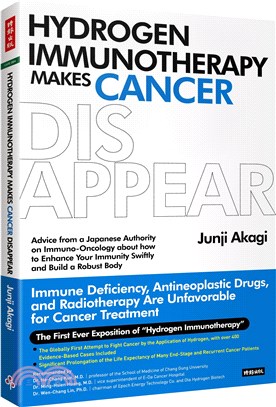Hydrogen Immunotherapy Makes Cancer Disappear
商品資訊
ISBN13:9789571397191
替代書名:水素ガスでガンは消える?!
出版社:時報文化
作者:赤木純兒
譯者:WAN-JOU TSENG
出版日:2021/12/22
裝訂/頁數:平裝/192頁
規格:21cm*13.8cm*1.1cm (高/寬/厚)
重量:437克
商品簡介
Advice from a Japanese Authority on Immuno-Oncology about how to Enhance Your Immunity Swiftly and Build a Robust Body
Immune Deficiency, Antineoplastic Drugs, and Radiotherapy Are Unfavorable for Cancer Treatment
The First Ever Exposition of “Hydrogen Immunotherapy”
.The Globally First Attempt to Fight Cancer by the Application of Hydrogen, with over 400 Evidence-Based Cases Included
.Significant Prolongation of the Life Expectancy of Many End-Stage and Recurrent Cancer Patients
Hydrogen Activates Human Immune Cells!
The probability of developing cancer has increased significantly with the extension of the average human lifespan. There is an increasing number of literature demonstrating the diverse bioactivities inducible by oxyhydrogen inhalation, including anti-inflammatory, anti-reactive oxygen species (ROS), and antineoplastic effects.
Evidence has also suggested that hydrogen may be used to mitigate the side effects of traditional chemotherapy, or to inhibit the growth of cancer cells and xenotransplanted tumor. In addition, the application of oxyhydrogen in the treatment of COVID-19 may not only reduce the symptom associated with difficulty breathing, but also exhibit the critical anti-inflammatory effect.
This book is the first collection of the research and comments made by a Japanese immuno-oncologist on “hydrogen immunotherapy.” Apart from the promising and extensive application in clinical treatment, hydrogen is helpful to prolong the healthy lifespan when used in daily care and health maintenance as well.
Recommended by
Dr. He-Chang Kuo, M.D.│professor of the School of Medicine of Chang Gung University
Dr. Ming-Hsien Huang, M.D.│vice superintendent of E-Da Cancer Hospital
Dr. Wen-Chang Lin, Ph.D.│chairman of Epoch Energy Technology Co. and Ota Hydrogen Biotech
作者簡介
Junji Akagi
Immuno-oncologist
Specialist and supervising physician of Japan Surgical Society
Specialist and supervising physician of Japan Society of Gastroenterological Surgery
Accredited physician for cancer treatment in Japan
Accredited physician of the Society for Integrative Medicine Japan
Member of council of the Society for Integrative Medicine Japan and Director of the Kumamoto affiliate
Director general of International Society for Hydrogen Medicine and Biology
Dr. Akagi was born in Sasebo City, Nagasaki Prefecture in 1954. After graduating from the College of Liberal Arts of Kyushu University, he attended the School of Medicine of the former Miyazaki Medical University. Intended to become an ideal physician, Dr. Akagi spent day and night studying during his stay at the School of Medicine. In order to gain knowledge and experience, he had even studied in the US at the National Cancer Institute of the National Institutes of Health. While abroad, Dr. Akagi realized the very fact that in every three cancer patients who came to seek treatment, one would eventually die. Although he was disappointed by the situation, he has since striven to rescue terminal cancer patients via every possible measure. Along the way, Dr. Akagi has learned many treatment approaches and chosen to specialize in the field of integrative medicine, where he has met the discipline of hydrogen therapy and established hydrogen immunotherapy as an immunology specialist.
譯者簡介
Wan-Jou Tseng
Wan-Jou Tseng was a radiographer and sonographer at National University Hospital of Singapore and a postgraduate student of medical ultrasound in Cardiff University. Tseng is a Taiwanese freelance translator specializing in medical and scientific translations.
序
Foreword
“Goodness! The tumor in the lymph nodes was gone! We actually have just started the treatment two weeks ago...” As a specialist in immuno-oncology, I have been treating cancer for over three decades. During these thirty years, various cancer therapies have been developed with the advances in the field of medicine. Although they may be helpful to some patient groups, we are still lacking a single treatment that has been recognized to be effective to most people.
I have been attempting day after day, as a doctor, to mitigate the suffering and to prolong the lives of my patients by all means. In my career, I have never seen any patient experiencing such a speedy recovery in just two weeks. Frankly speaking, when Ms. K.H, 68 years old, came in to our hospital two weeks ago, I even thought to myself, “this lady may not be able to leave this place alive.” That’s exactly how serious her condition was.
The recurrence of her breast cancer had metastasized to her bones, liver, and cervical lymph nodes, generating a substantial mass on the right side of her jaw. I knew from my previous experience that she was in a critical condition, but I wanted to save her still. This desire prompted me to try on something that was introduced to me not long ago—hydrogen, something that is ubiquitous in nature and present in us all.
The swelling of the lymph nodes was gone after the application of hydrogen for two weeks.
Ms. K.H had experienced a breast cancer recurrence and metastases to cervical lymph nodes, resulting in her swollen jaw. After adding hydrogen to the earlier treatment, the swelling disappeared rapidly within two weeks.
In my usual practice, I use immunotherapy to treat cancer and my treatment protocol basically consists of hyperthermia therapy, low-dose antineoplastic drugs, and Opdivo® (the medicine used in cancer immunotherapy). In Ms. K.H’s case, by the addition of hydrogen, I was deeply surprised to see the remission of her hypertrophic right submandibular gland in just a short period of two weeks.
Since January 2015, Ms. K.H had continued to take antineoplastic drugs, such as Avastin®+paclitaxel, Avastin®+Abraxane®, and Halaven® for treatment of her recurrent breast cancer, but the value of the tumor marker CA 15-3 had been increasing steadily. Until July 6, 2016, the value rose up to 1630 accompanying her lymph node swelling. This soaring trend is specific to patients with breast cancer. Normally, the value of the tumor marker CA 15-3 should be lower than 31.3. An abnormal level this high may be reflective of the potential presence of multiple metastases to bones and liver. Nevertheless, in two weeks after receiving the combined treatment of immunotherapy and hydrogen, the right submandibular gland hypertrophy had disappeared and Ms. K.H was discharged in good health. On August 3, approximately one month later, the CA 15-3 value had decreased to 1132.
Before I started treating Ms. K.H, I was introduced by one of my friends to a hydrogen generator, and it was suggested that “hydrogen is useful in cancer treatment.” I was not persuaded initially, but after I realized that hydrogen does not result in potential explosion hazard and is beneficial to the human body in many ways, I couldn’t help thinking, “perhaps this is something worth trying.” Afterwards I witnessed Ms. K.H’s case, which brought me to an idea that “hydrogen may become one of the great promises for cancer treatment in the future.”
Consequently, I have begun to perform ongoing research and established hydrogen immunotherapy at last. This is the first attempt in the world to treat cancer with hydrogen, and we have successfully cured more than 400 patients to significantly prolong the remaining lifespan of many end-stage or recurrent cancer patients. In addition, I published my article in the British academic journal, Oncology Reports, and received considerable attention globally. In December 2018, I gave a speech about “the advent of the application of immunotherapy for advanced cancer—combined immunotherapy” at the 6th World Integrative Medicine Congress held in Shanghai, China (where 2,500 doctors participated). In May 2019, a group of 40 doctors from China attended the event hosted by the Society for Integrative Medicine Japan at Aichi Medical University. Also, in mid-June of the same year, I departed for Guangzhou, China to attend a relevant event.
Written in the above-mentioned background, this book documents the details of the unprecedented hydrogen immunotherapy in the world. While the standard of care, including antineoplastic drugs and radiotherapy, has failed to cure cancer and becomes a hopeless option by physicians, I wish to inform the distressed or exhausted patients and families of a potentially promising treatment approach, the mechanism and case reports of which are covered in this book. I think, even if you have been told, “there is nothing we can do for you now,” or asked, “are you willing to consider palliative care?” it would be truly a blessing to learn that there is still hope of survival.
目次
Recommendations
I. Can Oxy-hydrogen be Used to Treat COVID-19?
By Dr. He-Chang Kuo, M.D., Professor of the School of Medicine of Chang Gung
University
II. Does Hydrogen Make Cancer Disappear?-My Opinion about Oxy-hydrogen Therapy
By Dr. Ming-Hsien Huang, Vice Superintendent of E-Da Cancer Hospital
III. Persistence Turns what Seemed Unbelievable Yesterday into the Convention of Tomorrow
By Dr. Wen-Chang Lin, Ph.D., Chairman of Epoch Energy Technology Co., and Ota
Hydrogen Biotech
Foreword
Chapter 1 Some Cancer May Disappear, while Some May Not
Rapid- and Slow-Growing Cancers
Cancer Development Is Contributed by Your Lifestyle
95% Cure Rate of Early Cancer
Advanced and Recurrent Cancer Create a Refractory Condition Within Our Bodies
Diet Therapies Are Helpful but Not Enough
Chapter 2 Patients Have No Choice
What Are the Three Major Types of Cancer Treatment?
What Is the "Standard of Care"?
The Reason Why the Standard of Care Fails to Cure Terminal Cancer
The Number of Six Hundred Thousand Cancer Refugees Continues to Grow
One Specific Treatment to Save Cancer Refugees
Chapter 3 Immune Deficiency Is an Obstacle to the Success of Antineoplastic drugs and
Radiotherapy
The Reason Why Current Treatment Options Aren't Working
Even Cancer Experts Have No Idea about the Importance of Immunity
The Cancer-Immunity Cycle Is the Key to Cancer Prevention
To Build a Robust Body with Your Immunity Is of the Utmost Importance
Chapter 4 Curing End-Stage Cancer Patients With Hydrogen
How Can Hydrogen Help to Enhance Immunity?
What Exactly Is Hydrogen?
Lift the Immunosuppression to Achieve Successful Treatment Outcome
Hydrogen Increases Opdivo? Response Rate by 40%
Hydrogen Inhalation Causes No Pain and Suffering
Don't Be Afraid to Know Your Remaining Lifespan. Hydrogen Is Your Helper for
Cancer Elimination
Hydrogen Activates Mitochondria to Boost Your Immunity!
What Are Mitochondria?
Mitochondria Are the Energy Factory of the Human Body
Fasting Increases Mitochondrial Activity
Hydrogen Improves Mitochondrial Function
Mitochondria Quality, Good or Bad
Chapter 5 Simple Habits to Boost Your Immunity
7 Ingredients to Improve Mitochondrial Health
Maximize Your Mitochondria with Aerobic Exercise
40℃ Warm Water Baths and High-Quality Sleep Revitalize the Body
Create Your Own Stress-Relief Strategies
Promote Bowel Health with Japanese Fermented Foods
When Your Immunity Remains Low After Trying Everything
Chapter 6 Return to Work Despite "Having Only Two Months to Live"
Sheltering Cancer Patients, Witnessing Their Recoveries
Clinical Cases of Hydrogen Therapy
Case 1: Ovarian Cancer (Stage 4) /Ms. K.H 33 years old
Case 2: Lung Cancer (Stage 4) /Ms. H.S 62 years old
Case 3: Breast Cancer (Stage 4) /Ms. K.M 46 years old
Case 4: Colon Cancer (Recurrence) /Ms. T.K 77 years old
Case 5: Ureteral Cancer (Stage 4) /Mr. K.K 69 years old
Case 6: Breast Cancer (Recurrence) /Ms. T.M 53 years old
Case 7: Prostate Cancer (Recurrence) /Mr. S.T 79 years old
Case 8: Pancreatic Cancer (Stage 4) /Ms. M.M 81 years old
Chapter 7 Hydrogen Prolongs Healthy Lifespan by 10 Years
Reaching the Average Life Expectancy in Good Health
Hydrogen Application Prevents Dementia
Alzheimer's Disease Can Be Prevented via the Prevention of Intracerebral Oxidation
Hydrogen Is a Promising Hope for Treatment of Parkinson's Disease
Hydrogen Facilitates Stroke Treatment and Prevention
The Significance of Hydrogen in Myocardial Infarction Treatment and Prevention
Hydrogen Soothes Myalgia and Arthralgia
Hydrogen Works Through the Same Pathway as Sirtuin Genes (Longevity Genes)
An Age-Related Decline in Mitochondrial Function Is Observed in Males Since Age 42
Remove Excess Fat and Maintain a Slim Body
Stress Reduction-Reducing the Origin of Diseases
Chapter 8 The Era of Customized Treatment Approaches
"Optimal Medicine" Is the Evolved Version of Integrative Medicine
The Immunity Helps to Raise the Natural Self-Healing Ability of Our Bodies
Simplify Surgical Procedures by Hydrogen Immunotherapy
Hydrogen Reduces Damage Caused by Radiotherapy and Antineoplastic Drugs
Achieve Healthy Longevity by Mitochondria
Conclusion
書摘/試閱
Chapter 1 Some Cancer May Disappear, while Some May Not
˙Rapid- and Slow-Growing Cancers
Did you know that the growth rate of various carcinomas, albeit all being called by the same name as cancer, may vary based on their primary origins? Certain types of cancer, such as pancreatic cancer and cholangiocarcinoma, are difficult to detect at their early stage and fast-growing compared with other cancers. In these cases, remission is rarely seen, and significantly increased recurrence risks are observed even when the tumor is surgically removed. Poor prognosis has made close post-operative monitoring a necessity for these patients. On the other hand, thyroid cancer is a good example of slow-growing cancers. With its generally good prognosis, it has been reported that many patients have survived up to ten years in peaceful coexistence with thyroid cancer.
In 2017, cancer types shown with a higher mortality rate were inclusive of lung, colorectal, stomach, pancreatic, liver and breast cancers. Among them, colorectal cancer and breast cancer are associated with better prognosis, followed by stomach cancer and lung cancer. In contrast, pancreatic cancer is linked to substantially poorer prognosis, while liver cancer shows a slightly less poor scenario. Prognosis is highly related to the probability of metastasis. In other words, cancers associated with good prognosis are basically non-metastatic.
Moreover, the growth rate of various carcinomas may differ depending on cancer grading and immunogenicity. The concept of cancer grading is referred to as the fact that different organs may give rise to different types of cancer cells, and the growth rate of cancer cells is primarily determined by its grading. That is to say, a single type of cancer cells does not spread across the whole body to cause multiple diseases. Instead, cancer cells may be generated differently by the individually cancerized organs. For example, pancreatic cancer developed from cancer cells originating and proliferating in the pancreas is considered of high grading, which can be aggressive and rapidly progressing. On the contrary, thyroid cancer formed by cancer cells generating in the thyroid gland is considered of low grading, and may be equally implied as slowly progressing.
Another decisive factor is immunogenicity, which is correlated with the amount of antigens (cancer markers) expressed on a specific type of cancer cells and identifiable by immune cells. If the expressed antigens are easily recognized, it is highly likely that cancer cells, prior to proliferation, may be destroyed by the immune system to prevent metastasis and result in better prognosis. By contrast, in the event that early recognition of antigens is unachievable, which means that immune cells are easily evaded by cancer cells, the probability of metastasis may rise and lead to poorer prognosis.
Consequently, cancer grading is also decided on whether malignant cells are easily identified by the immune system or not. To put it another way, cancer cells arising from the pancreas is considered of high grading because they are hardly identified by immune cells, whereas cancer cells generating in the thyroid gland is considered of low grading because they are easily spotted by the immune system.
˙Cancer Development Is Contributed by Your Lifestyle
Cancer is easily formed when our immune system becomes weakened. The primary causes of low immunity are stress and lifestyle, which means one of the keys to cancer prevention lies in immune enhancement achieved by stress reduction and lifestyle correction. According to some theory, there are 5 thousand cancer cells generated in the human body each day. People without cancer do not exhibit any signs of illness because their immunity is strong enough to suppress cancer cell proliferation. Yet, people affected by immunodeficiency may develop cancer since their natural defense mechanisms fail to stop the reproduction of cancer cells.
Allegedly, one in every two Japanese may suffer from cancer. This description may be translated into a 50% of abnormal immune responses in Japanese population. Starting from the 1970s, supermarkets and fast foods have begun to flourish in Japan. In the meantime, patients suffering from hay fever, ulcerative colitis, and Crohn's disease have started to increase in proportion. While these disorders are caused by an overreaction of the immune system, cancer is resulted from immune deficiency, which is at the complete opposite end of the spectrum of immune abnormality.
It has been suggested that such diseases are arisen from modern lifestyles. But in any case, dietary styles surely make the most impact on the status quo. Food products that are readily served by supermarkets and fast food restaurants contain a large amount of additives and preservatives, overconsumption of which should be avoided. Nonetheless, it is almost impossible to completely wipe them out of our lives. So what do we have to do with this?
First of all, immune enhancement is the most important thing for everyone. It is said that our body produces five thousand cancer cells per day. The maintenance of high levels of immunity may protect us against cancer development by suppressing cancer cell proliferation. In the case of patients with stage 4 cancer, immunotherapy may be helpful to strengthen the self-healing ability and to win a chance of extending survival for another 1, 3, or 5 years. We have been taking care of many stage 4 patients in our hospital, who have proven to us the utmost importance of immune enhancement during cancer treatment.
主題書展
更多書展購物須知
為了保護您的權益,「三民網路書店」提供會員七日商品鑑賞期(收到商品為起始日)。
若要辦理退貨,請在商品鑑賞期內寄回,且商品必須是全新狀態與完整包裝(商品、附件、發票、隨貨贈品等)否則恕不接受退貨。













